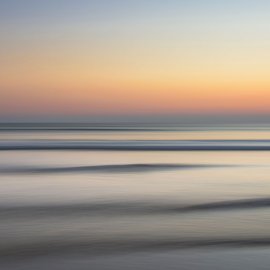The Halcyon Ocean
-
English
-
ListenPause
[intro music]
Welcome to World Ocean Radio…
I’m Peter Neill, Director of the World Ocean Observatory.
Here is an evocative story: According to Greek mythology, Alkyone, the daughter of the god of the winds, became so distraught when she learned that her husband had been killed in a shipwreck that she threw herself into the sea and was changed into a kingfisher. As a result, ancient Greeks called such birds halcyon and the myth ensued that these birds built floating nests on the ocean that so moved the wind god that he created a state of breathless quiet on the water that protected the eggs until the fledglings were born. This legend prompted the use of halcyon both as a noun naming a genus of kingfisher and as an adjective describing unusual, primordial calm.
Calm can be associated with the ocean – a state desirable as an alternative to chaos. On a recent trip to Antarctica, there was much discussion of the Drake Passage, a convergence of current and weather from Cape Horn south, that was portrayed as a collision of wind and wave that wrecked ships and marked its sailors for life as survivors. Our passage both ways was across a placid sea, birds and dolphins racing alongside, not even a hint of any storm to come. I can’t say that I was disappointed.
Calm can be also associated with an inner state of being – a neuro-chemical-physical quietude that is a desirable condition that expels and denies the neurotic conditions of our lives and brings us peace of mind and body. Be calm we say to soldiers under attack, rebels with violent causes. Be calm, we say to our children grappling with their futures; be calm, we say to our parents and friends in illness or the fear of death. Be calm, we say to ourselves en route to Antarctica: Chill, it’s going to be a Drake Lake, and it was.
Why is it that all major religions involve water as an essential place of ritual: baptism, cleansing, purity of purpose and soul? The ocean is a vast reservoir of water to the point of no dimension: its horizon has no meaning; its depth and breadth cannot be perceived, disorienting in space and disconnecting in time. The ocean is in constant movement, and there is no for-telling even with the best observations above and below that can be said to be certain. A storm can materialize in a sudden shift of pressure; a wind can reach gale force by a minor adjustment of degree; a reef or bar can appear when the charts and satellites assert that for all time there has been nothing there. Clearly, the ocean strikes every chord, each lost in one coherent resonating tone.
I have a friend, colleague, and fellow ocean advocate, Wallace J. Nichols, who for years has given out a simple blue glass marble as a evocation of the Earth from space – presented to any and all, from national presidents to the Dalai Lama to the most secular surfer, literally to thousands who understand the ocean calm, directly or indirectly, through experience, study, and intuition. I have emulated this distribution myself, carrying marbles with me as an almost perfect metaphor that I can hold up to the light to release the calm, the fluidity, and the peace of the ocean world in my hand. It connects, it captures and refracts all the available light, and it consistently elicits a quiet understanding between those assembled, even in a crowded elevator, a giant auditorium, and across borders of nations and the boundaries of language. J. writes about “blue mind,” what he measures physically in the body, psychologically in the head, and spiritually in the heart – a pervasive state of harmonic blue. He has relentlessly spread this message and I hope he will never stop.
How many stories in how many cultures is there an account of the wife bereft of her fisher husband lost at sea, grieving and regenerating through immersion in such a dynamic, mysterious space? How many floating nests will be accommodated by the ocean, over how many generations? How many fledglings will find the ocean calm to clear their way?
Halcyon!
We will discuss these issues, and more, in future editions of World Ocean Radio.
[outro music]
This week we are talking about ocean calm and the ways that we are affected in mind, body and spirit by a peaceful ocean. In this episode we tell the myth of Alkyone and her transformation from woman to kingfisher, and the breathless calm required to hatch her fledglings at sea.
hal·cy·on
/ˈhalsēən/
1.
adjective
denoting a period of time in the past that was idyllically happy, calm, and peaceful.
2.
noun
A bird in Greek legend generally associated with the kingfisher. There was an ancient belief that the bird nested on the sea, which it calmed in order to lay its eggs on a floating nest.
Do you prefer the written word? Head on over to Medium.com/@TheW2O.
About World Ocean Radio
World Ocean Radio is a weekly series of five-minute audio essays available for syndicated use at no cost by college and community radio stations worldwide. Peter Neill, Director of the World Ocean Observatory and host of World Ocean Radio, provides coverage of a broad spectrum of ocean issues from science and education to advocacy and exemplary projects.
Image
Jonathan Bean on Unsplash
- Login to post comments



